|
writing them down. Then he got his boy Jabo in there, John
Starks. Jabo's James' yes-man so he's like over-emphasizing
everything that James was saying. Every time James says something,
Jabo be like: "Oooo! Wow! Ooooo! Ooowee!"
We looking at James, we looking at Jab, we looking at James,
we looking at Jab. And we like, it must be cool because Jabo's
trippin'! (laughter)
It's crazy, man, you got me started now.
James keeps popping these figures. "Nah. I'm gonna give
y'all... three hundred dollars."
And we like: "Aw, man, we got too much happening. We
flew for the first time, limo for the first time, made 15
dollars the night before, and this cat's talking about all
this money."
He says, "Nah. Think I'm gonna give y'all... three twenty-five."
We talk a little bit more. He says, "Nah, think I'm
gonna give y'all three fifty." Then he said, "What
ya'll writing down?"
We said, "Well, Mr. Brown, we breaking it down. See
how much everybody gets."
He says, "No. No, no, no! That's what everybody gets.
Everybody get the same thing. Everybody gettin' that."
We thought when he said three seventy-five, he's talkin'
about total for the whole group, right? To make a long story
short, when we leave outta there we're making something like $450 a night apiece.
We got like three new changes of uniform with matching shoes.
We got all the equipment under the sun. We got a Golden Eagle
bus to travel on. We got an equipment truck full of equipment,
you know what I mean?
outta there we're making something like $450 a night apiece.
We got like three new changes of uniform with matching shoes.
We got all the equipment under the sun. We got a Golden Eagle
bus to travel on. We got an equipment truck full of equipment,
you know what I mean?
So it goes without saying we pinched ourselves for a month
or two because we didn't believe it.
We went through that. We learned as much, got as much as
we could from being affiliated with James.
Five-O: The pace must have
been pretty hard core for the band of The Hardest Working
Man in Show Business?
Kash: Aw, yeah. You know what
though? He had to cool us down. He had to cool us down a little
bit. Because we 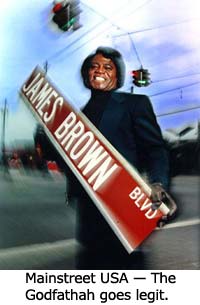 played
so hard and we were so strong and fired up, and we really
were always tight together, because we knew each other very
well on and off stage. And we were trying so hard. So our
whole thing was, this is James Brown. You know? You gotta
give it UP for him. You gotta be GOOD for him. I grew up,
man, listening to those drum licks, man. And Bootsy grew up
listening to the bass licks. Catfish, the guitar licks. And
we just knew - we had to dig in deep. First thing James did,
was kinda like cool us down a little. "Hey, hey, calm
down, calm down." played
so hard and we were so strong and fired up, and we really
were always tight together, because we knew each other very
well on and off stage. And we were trying so hard. So our
whole thing was, this is James Brown. You know? You gotta
give it UP for him. You gotta be GOOD for him. I grew up,
man, listening to those drum licks, man. And Bootsy grew up
listening to the bass licks. Catfish, the guitar licks. And
we just knew - we had to dig in deep. First thing James did,
was kinda like cool us down a little. "Hey, hey, calm
down, calm down."
The first thing he told me was, too much foot. I'm like,
wait a minute. Too much foot? Then I realized as time went
on what was going on with that whole thing. We were just too
fired up.
And I realized too how rhythm worked to him. Rhythm really
had a dominant effect on James Brown. That's that African
in him, you know what I mean? He just reacted to the rhythm.
I've seen his body react to rhythm in a way that hurt ME.
I couldn't figure out how all those different things happen
at the same time on one body.
We stayed with James and got as much as we could out of that.
As bad as he was, and as much as we respected him, he was
like a father figure to us. Don't nobody want to hang with
their dad, you know? As a buddy. So we stayed as long as we
could then we split called ourselves the House Guests.
HOUSE GUESTS & HENDRIX
Kash: The House Guest thing
was us again, doing our own thing. We scuffled and did some
session recordings, a couple songs. The irony 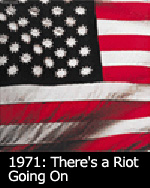 to
that was the record didn't leave the city. A little local
thing, we didn't have any force, we didn't have any distribution.
So it didn't go nowhere or do nothing. And lo and behold,
years and years and years later, I go to Japan, and the song
is on CD. This is a little wax joint we did, you know a 45
in Cincinnati, Ohio, right? It never left the city, and never
really got ample play in the city, you know? to
that was the record didn't leave the city. A little local
thing, we didn't have any force, we didn't have any distribution.
So it didn't go nowhere or do nothing. And lo and behold,
years and years and years later, I go to Japan, and the song
is on CD. This is a little wax joint we did, you know a 45
in Cincinnati, Ohio, right? It never left the city, and never
really got ample play in the city, you know?
I might still be getting royalties for that song to this
day. Japanese, European market, that stuff sells all over.
After leaving James, James had that orderly, military type,
disciplinary - the discipline was good. We got a lot out of
that. We got professional discipline out of that. Professional
discipline I consider is the kind you just do because you
know that it's the right thing to do, as opposed to being
forced to do it. We got the disciplinarian aspect of it. But
we were still wild. We were young as hell and wild too. When
we were with James, we would listen to Jimi Hendrix and Howlin'
Wolf, you know what I'm sayin'? That was where our heads were
at.
As a matter of fact Jimi Hendrix wanted us to be his band
before Buddy Miles and those guys. He wanted a 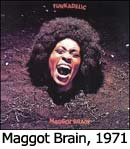 black
group. After the Experience, he wanted a black group. Jimi
wanted us to quit James and he would pick us right up, and
the guys didn't feel good about that so it didn't happen.
If it had happened history might be totally different right
now, might be crazy as hell, I don't know. But we didn't do
that. But that was our cat, you know. black
group. After the Experience, he wanted a black group. Jimi
wanted us to quit James and he would pick us right up, and
the guys didn't feel good about that so it didn't happen.
If it had happened history might be totally different right
now, might be crazy as hell, I don't know. But we didn't do
that. But that was our cat, you know.
"YOU SURE REMIND US OF THE FUNKADELIC"
Kash: Point is, when we left
James, we went crazy. We went wild. We did the House Guests
thing. So now we're hearing, you cats sound like the Funkadelic,
sure remind us of Funkadelic, you look like Funkadelic - hey,
we never saw Funkadelic. Never heard them. One of those phenomena
that happen like once in a lifetime. Never saw them, never
heard of them, yet we constantly heard this.
We played Detroit thirty years ago at a place called The
Scene and Mallia Franklin, who was the lead singer for the
Parlettes, she told George about us, and convinced him to
come check us out. And he was looking for a new direction
musically with his band and everything. She convinced him
to come check us out, and when he did, 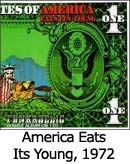 from
that point on, from that night we became Funkadelic. from
that point on, from that night we became Funkadelic.
First project we worked on was America Eats Its Young. Very
first song I did was "Pussy," "Call My Baby
Pussy." Big song for us.
Now what George did, George gave us total freedom. So from
James, we had a disciplinarian, and George gave us total freedom.
So we had to find a happy medium. And we did a pretty good
job of it. We realized not to go too deep, off one end. And
at the same time we also realized we were freed up from that
other thing that had us shackled. So we had creative freedom
and we expected discipline. It worked out very well for us
and it worked out for George, because it gave George a different
direction which was refreshing. It was the first time he ever
used horns. Our horns were the first horns he ever used. It
was the first time he ever got into arrangements, dynamics,
like highs and lows, stops, breaks all that stuff.
Because Funkadelic's thing was like a groove. One of them
guys would start a 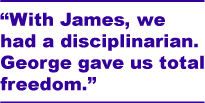 groove,
like Eddie Hazel, or Billy Nelson would start a groove and
one by one they would come in and just ride that groove forever.
We played arrangements. We had an arranged show. And it was
refreshing for George, you know? groove,
like Eddie Hazel, or Billy Nelson would start a groove and
one by one they would come in and just ride that groove forever.
We played arrangements. We had an arranged show. And it was
refreshing for George, you know?
We recorded "America Eats Its Young," one of the
biggest cross-over albums we'd ever done.
We were an act. Independently. George being the scrupulous
businessman that he's always been, he could see that. He said,
you know what? Why don't y'all hone in on the act and we started
working on that, so we broke away from Funkadelic for a minute.
I will always say this: I've always remained Funkadelic under
whatever conditions. We broke away and then we called ourselves
The Complete Strangers. What we were doing, we were getting
back into our own, creating this act that evolved into Bootsy's
Rubber Band. We traveled around getting gigs and got back
into ourselves as a group, as a unit. Formulated Bootsy's
Rubber Band.
BOOTSY
Kash: I always say it's funny
because Bootsy was kind of like George's 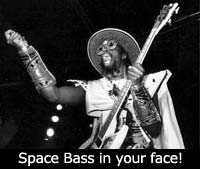 alter-ego.
Bootsy is the guy George has got in him but he just didn't
want to have to be everyday. Didn't wanna be sharp like that
and that star type thing every day. He refuted that for a
lot of years. Bootsy was right on it, right into it. alter-ego.
Bootsy is the guy George has got in him but he just didn't
want to have to be everyday. Didn't wanna be sharp like that
and that star type thing every day. He refuted that for a
lot of years. Bootsy was right on it, right into it.
And me, I always remained Funkadelic, so whenever Bootsy's
Rubber Band were on hiatus, I would go out with Funkadelic
and vice versa. And we did that for a while. And we rolled
it and rolled it and rolled it. Until things kind of chilled
out a little bit.
I don't remember the exact year but it was when we had the
project "Player of the Year," one of our biggest
projects as the Rubber Band.
SLY FOX
Kash: I did a thing in the
'80s with a couple of Rubber Band members, Gary "Mudbone"
Cooper and "Razor Sharp" Johnson, I put together
a band for this act called Sly Fox. Sly Fox had a big song
called "Let's Go All The Way," big song, number
three on the pop charts all over the world. Number three on
MTV's Top Ten. This was before we could even get played on
MTV as P-Funk, you know?
Big song. (Sings) "Let's go all the way. Let's go all
the way. Yeah, yeah, yeah. We can make a better day."
During that Rubber Band thing, the Mothership landings and
all that were all intertwined together. That's when we were
doing the big mega-tours with everybody. I worked with both
groups.
SLY STONE
Kash: At a certain point I
hooked Sly Stone and George Clinton up together. Ironic how
that happened. I gained Sly's trust, just by being really
into him, really digging him and being there for him. Once
he realized I had that in me, I earned his trust.
I also realized he had problems, insecurities and psychological
things where he went through so many trips and changes 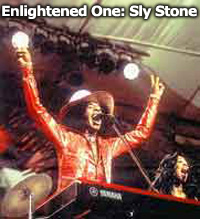 in
the industry. I remember he explained to me, remember when
he got that bad reputation for not showing up? He said what
happened was, he got so large, promoters would actually book
shows in three different places on the same night and get
the advance sales and then run. Get out of the city. And Sly
would get all the bad press. in
the industry. I remember he explained to me, remember when
he got that bad reputation for not showing up? He said what
happened was, he got so large, promoters would actually book
shows in three different places on the same night and get
the advance sales and then run. Get out of the city. And Sly
would get all the bad press.
When he realized he had that little control over who he was,
he just said forget it, man. He also told me, Baby Boy, you
know what? All those cats that started out with me, I started
realizing all of them became millionaires. But nobody could
tell me how much I was worth.
He had given up pretty much on the whole thing and I gained
his trust and confidence and got him to get back into trying
a little music. One thing led to another. Our financier gave
me a budget to take him from California to D.C. during Martin
Luther King's birthday. I'll never forget it because we met
Jesse Jackson going into the hotel. So George had gotten tied
up and just left so I had to drive Sly from D.C. to New York
to meet with George. They met for a minute, George was doing
a lot of stuff back then, he was very, very busy.
So I got orders to take him from Manhattan to Michigan to
George's farm. And the rest was funk history because Sly did
a tour with us called the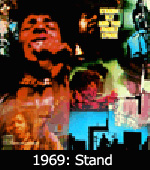 Greatest Funk On Earth Tour, that's with P-Funk, Rubber Band,
Roger Troutman & Zapp, the whole P-Funk mob was there,
Sly Stone included. He and George did a lot of studio stuff.
It was a good thing, you know, it really got him back into
at least music, because he's one of the most prolific writers
to this day. What happened from that was that he and Jesse
Johnson from the group The Time, they went into the studio
after that little run, they came up with a #1 hit, "Crazay."
Greatest Funk On Earth Tour, that's with P-Funk, Rubber Band,
Roger Troutman & Zapp, the whole P-Funk mob was there,
Sly Stone included. He and George did a lot of studio stuff.
It was a good thing, you know, it really got him back into
at least music, because he's one of the most prolific writers
to this day. What happened from that was that he and Jesse
Johnson from the group The Time, they went into the studio
after that little run, they came up with a #1 hit, "Crazay."
Just from Sly's writing and his affiliations, that song went
immediately to #1. I feel very good about that. He's one of
those idols in my life who I've always looked up to. I was
able to get close enough to him to find out who he really
was beneath the facade and the ego. He had trappings for you;
if he didn't feel comfortable with you being around he had
trappings where you couldn't see what was in front of you.
He actually played a big brother figure in my life, taught
me a whole lot about things that I needed to know.
P-FUNK ALL STARS, 1990-PRESENT DAY
Kash: It's been incredible.
Very, very, very exciting. And it's been a learning experience.
Long as I can 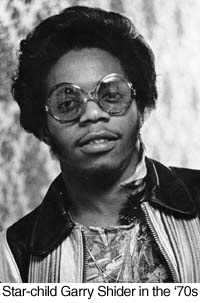 keep
with it and experience new and different things - my real
draw card is, as long as I know these different cities want
us to come and perform and entertain, they know it's going
to be a good time; they know we gonna bring George and it's
gonna be a positive experience. As long as we got that going
on? Hey man, I'm there. I am there. keep
with it and experience new and different things - my real
draw card is, as long as I know these different cities want
us to come and perform and entertain, they know it's going
to be a good time; they know we gonna bring George and it's
gonna be a positive experience. As long as we got that going
on? Hey man, I'm there. I am there.
God forbid it ever comes the day when I look up and I hear
somebody say, "Awwnuh. Heeere we go again." Then
it's like, OK - maybe not. But as long as I know it's a good
thing, spreading joy, man, because people need it.
We're working a lot. Pretty constant. Pretty much permanent
tour. It's a good thing, man, because what that entails is
the time that we put in and all the energy and the effort,
the blood, sweat and tears, we won the trust of our fans.
Our fans trust us. In this industry you can't really ask anything
better than that, to have trusting, loving fans - they know
what they gonna get from us. They know what we have to offer
them. They know we gonna give a hundred percent.
P-Funk is the new drug of choice - people need their funk
fix, you know? We bring the party with us. There used  to
be a time where the after-party was a big deal. After a while,
people realize this is the show and the after-party all in
one. Ain't nobody else doing four hours but us, no way. To
this day. They think we're crazy, our buddies and cohorts,
artists and entertainers, they think we're out of our mind.
You got to rest for that, eat right for it. You gotta be smart
and take good care of yourself. to
be a time where the after-party was a big deal. After a while,
people realize this is the show and the after-party all in
one. Ain't nobody else doing four hours but us, no way. To
this day. They think we're crazy, our buddies and cohorts,
artists and entertainers, they think we're out of our mind.
You got to rest for that, eat right for it. You gotta be smart
and take good care of yourself.
I learned through my years of experimentation, trying this
and trying that - all these things get set in front of you,
all these hand-outs and gifts and tokens of love and affection
- I learned through checking this and trying that and getting
caught up on this and hung up on that. When I got my mind
back intact, when I got freed up again, I realized that my
best high was being onstage performing - that was the best
high ever in my life. It still is. To this day, it's the best
high.
It's funny, I don't care how bad you feel, maybe you caught
a little bug, how sick you are, you get onstage and in most
cases you do a hell 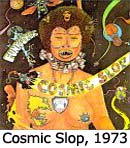 of
a show. Now before and after that show, you're holding yourself
up. But during that show it's funny how that motivation is
there like that. Cuts through everything. Incredible, man.
It's something I don't question and I don't try to figure
out. I leave that alone because that works. That works on
its own. of
a show. Now before and after that show, you're holding yourself
up. But during that show it's funny how that motivation is
there like that. Cuts through everything. Incredible, man.
It's something I don't question and I don't try to figure
out. I leave that alone because that works. That works on
its own.
LOCKING IN
Kash: Being the responsible
drummer that I am, I'm always leading from the rear. I remember
one time in Miami, Florida at the Jai Alai - it's this hall
that coupled sports and entertainment. The halls for the sport
Jai Alai are very hard, very cement-y, very echoey. We realized
from trial and error the sound was hard and full of echo.
So if you play too fast or too loud the whole point is missed
because all you get is echo - sound just bouncing around everywhere.
So we getting ready to play one night in Miami at the Jai
Alai and George sneaks up behind me. All the lights are out.
I hear, "Kash! Kash!"
I said, "Where you at?"
"Here! Right here!" It's George.
I go, "What's up, man?"
He said, "Play real slow. Play real slow."
I said OK, but the only thing was, I was the only one he
told that to, OK? So I'm pulling everybody back as far as
I can. And they all trippin', man, because they didn't know.
They think I'm trippin'-that there's something wrong with
me, right? I'm pulling them back and pulling them back, and
they really don't get it until George came  onstage
and they saw we were locked in. And that's one of those times
early on that showed me the power that I had. About being
a responsible drummer in a big group like that. onstage
and they saw we were locked in. And that's one of those times
early on that showed me the power that I had. About being
a responsible drummer in a big group like that.
First thing you do is create the vehicle for the group so
that comfort zone is there. Second thing you do is lock in
with the artist, the man who's one-on-one with the audience.
The third thing you do is lock in with the audience.
We've actually played songs where an audience got so comfortable,
so into it, they would go into a trance-like state. And every
now and again I would throw in a weird dynamic beat that would
throw them off and kinda snap them out of it and wake them
up. Then they would gradually go back to feeling comfortable
and I would do this all throughout the night so they wouldn't
miss the essence of what we were doing up there.
I learned when you make your artist comfortable, what he
does in return is he gives you the responsibility of taking
care of the group. Me and George sometimes have cues that
nobody else can see. He'll give me a breakdown or have me
bring it up, have me speed it up or slow it down, and won't
nobody else see that but him and me. Because I'm tuned into
him like that and he knows it. So he doesn't have to turn
around and overextend himself - "Do it like this! Break
it down right here!" None of that. That's what he plays
with me for. Same thing with Bootsy - me and Bootsy grew up
like that. Me and Bootsy know each other that way.
KA$H UP FRONT
Kash: So I went from leading
from the rear, which I still do to this day, to KA$H UP FRONT.
I've never been a real pushy kind of guy. I've always been
patient. So 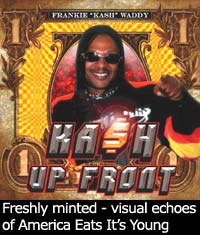 rather
than being in people's faces all they time - "Hey, man!
I got this! I got that! Bla bla bla!" - I'm not that
guy. I don't knock it but I'm not that guy. So when I did
start letting people hear my stuff, I'd always hear the same
thing. rather
than being in people's faces all they time - "Hey, man!
I got this! I got that! Bla bla bla!" - I'm not that
guy. I don't knock it but I'm not that guy. So when I did
start letting people hear my stuff, I'd always hear the same
thing.
"Man, who's that singing lead?"
Me.
"Who's that singing background?"
That's me backing me up.
"Wow! No kidding. Who's that playing the bassline on
keyboard? Who's doing melody on keyboard?"
I say, that's me. Then I just had to break it down for them.
Hey, I couldn't really afford a bunch of players, I didn't
have a budget. To have a bunch of cats, I really would have
loved to do it - I'm not trying to be president or nothing
like that. I couldn't afford to hire anybody.
It showed me people were really interested and blown away
in different aspects of me. They know I play drums for all
them different acts all these years. What they didn't know
is I write great lyrics, great ballads, I can play nice, tasty
keyboards - that's what KA$H UP FRONT is saying. Who's singing
lead? That's Kash.
It's eclectic. I didn't do a straight funk CD, because I
can do that with my eyes closed. I took advantage of the fact
that I didn't have to do that. I did one track that's a drum'n'bass
thing, one that's like a house thing, a European club dance
thing; I did some sequencer things catering to the hip hop
 community.
I did that on purpose because I went for a long time fighting
the sequencers, the MPCs and all that stuff. I turned on
the radio one day and everything I heard on the Top Ten was
done by MPC sequencers. I said, you know what? I can't be
corny. Because we got rejected when we first came in the game.
I said, now I'm not going to turn into that. So I buckled
down, I read and started learning. community.
I did that on purpose because I went for a long time fighting
the sequencers, the MPCs and all that stuff. I turned on
the radio one day and everything I heard on the Top Ten was
done by MPC sequencers. I said, you know what? I can't be
corny. Because we got rejected when we first came in the game.
I said, now I'm not going to turn into that. So I buckled
down, I read and started learning.
When I first started working out with this thing, the Akai
MPC 2000, I was drenched with sweat. I got some of that stuff
on there because I wanted the hip hop community to feel like
I had them in mind. Because then this thing is sound, you
know what I mean? So I got tracks with all those sounds that
get them off. Then I got ballads. When you get into it, you'll
see.
I wasn't just hunting for a hit. I just wanted to reach out
to different parts of myself, show some different sides. The
result is, I'm getting a great response.
NU PHOUND NATION TO THE FUTURE
Kash: Drums, bass and guitar
is the foundation of a rhythm section, the foundation of any
band. I was gonna call it The Funk Foundation, but I didn't
want to be that specific. Because sometimes when you do that
you leave out other genres automatically. I said, maybe The
Foundation. Naw, that's so common. So I did a little brainstorming
and came up with Nu Phound 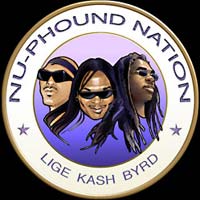 Nation.
Everybody loved it - it worked. Our first gig was at the 1650
Schrader club in Hollywood. It was a bang-up night. We headlined,
we did very well, had a great reception, we had industry people
there, we had fans there, we had great loyal support, everybody
was glad we were doing it - it was perfect. I'm looking for
big things out of that. Nation.
Everybody loved it - it worked. Our first gig was at the 1650
Schrader club in Hollywood. It was a bang-up night. We headlined,
we did very well, had a great reception, we had industry people
there, we had fans there, we had great loyal support, everybody
was glad we were doing it - it was perfect. I'm looking for
big things out of that.
I'm grateful. It's a blessing to be clear, to have direction
and value and self-worth and the love of my family and friends.
Right now I'm just moving forward through the grace of God. 
Interviewed by Nate Nichols
December 13, 2002
|






























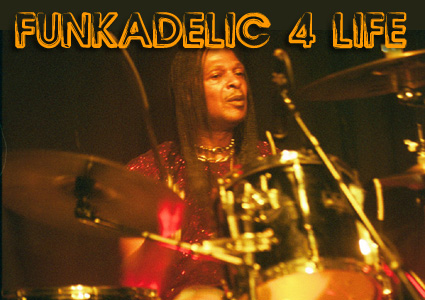
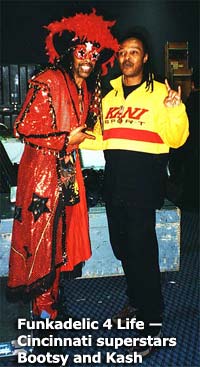 we
got an all black fanbase during that time frame. What we found
out through trial and error, the distributors, the records
stores and people selling the product, they ran out of our
stuff - they were going off on us: what's up with you guys?
We need more stuff! People coming in every day trying to buy
it, we don't have it. We went to the label and the inside
person at the label - I'm not gonna give any names - they
explained it to us. They said, you know what? I wasn't supposed
to let you guys know this but they only want you guys to sell
gold and stay in the black market. In other words, they didn't
want us to go mainstream, they didn't want us to go over to
suburbia. It was a quality control thing.
we
got an all black fanbase during that time frame. What we found
out through trial and error, the distributors, the records
stores and people selling the product, they ran out of our
stuff - they were going off on us: what's up with you guys?
We need more stuff! People coming in every day trying to buy
it, we don't have it. We went to the label and the inside
person at the label - I'm not gonna give any names - they
explained it to us. They said, you know what? I wasn't supposed
to let you guys know this but they only want you guys to sell
gold and stay in the black market. In other words, they didn't
want us to go mainstream, they didn't want us to go over to
suburbia. It was a quality control thing. 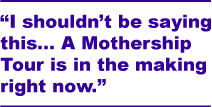 saw
the P-Funk. They saw Bootsy's Rubber Band. And they ran back
to their community with that information. "Man! Saw these
guys, man - and they landed a spaceship onstage! You won't
believe it! The music was great! And the costumes!" You
know.
saw
the P-Funk. They saw Bootsy's Rubber Band. And they ran back
to their community with that information. "Man! Saw these
guys, man - and they landed a spaceship onstage! You won't
believe it! The music was great! And the costumes!" You
know. 
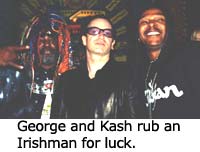 P-Funk.
They've heard the music. They've heard Snoop Dogg. They've
heard Dre's stuff, rappers' stuff - but they didn't know P-Funk.
They didn't know George Clinton and Bootsy Collins. They didn't
know that stuff. And when they saw what we did - we took that
particular Lollapalooza by storm. We ran with that one. From
that point on, now we got a new market from that.
P-Funk.
They've heard the music. They've heard Snoop Dogg. They've
heard Dre's stuff, rappers' stuff - but they didn't know P-Funk.
They didn't know George Clinton and Bootsy Collins. They didn't
know that stuff. And when they saw what we did - we took that
particular Lollapalooza by storm. We ran with that one. From
that point on, now we got a new market from that.  They
like, ho hum, they got their own thing going on. But then
I noticed at the mid-point of the show, I could tell by the
body language there was a different kind of excitement going
on.
They
like, ho hum, they got their own thing going on. But then
I noticed at the mid-point of the show, I could tell by the
body language there was a different kind of excitement going
on.  It
was incredible, man. It was a record breaker for the Apollo.
They never seen anything like this before. That goes back
to what I said about the adventurous ones, the ones that aren't
gonna take no for an answer.
It
was incredible, man. It was a record breaker for the Apollo.
They never seen anything like this before. That goes back
to what I said about the adventurous ones, the ones that aren't
gonna take no for an answer.  to
the Isleys, hey: you guys should go on right before us, because
we're a little stronger for this kind of thing. They said,
we the Isley Brothers, we got last. We said, OK fine. We'll
go on before you. Y'all come on last. And as we were playing,
they were leaving. As we were playing the Isley Brothers were
like sneaking out of there. Because they understood what we
were saying. And it wasn't nothing personal - it was just
how we do it.
to
the Isleys, hey: you guys should go on right before us, because
we're a little stronger for this kind of thing. They said,
we the Isley Brothers, we got last. We said, OK fine. We'll
go on before you. Y'all come on last. And as we were playing,
they were leaving. As we were playing the Isley Brothers were
like sneaking out of there. Because they understood what we
were saying. And it wasn't nothing personal - it was just
how we do it. 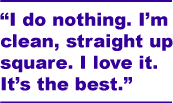 it's
not a joke. It's a very big responsibility. Because everybody
is depending for their security on a drummer being on point.
I've learned that - as I said through trial and error - maybe
something wasn't the way it shouldn't have been, maybe a lick
wasn't running the way it should have been, maybe my personal
thing wasn't the way it should have been, through chemicals
or whatever, I could see it in everybody else's face, they
were like uncomfortable. They didn't feel that security, that
comfort zone they needed.
it's
not a joke. It's a very big responsibility. Because everybody
is depending for their security on a drummer being on point.
I've learned that - as I said through trial and error - maybe
something wasn't the way it shouldn't have been, maybe a lick
wasn't running the way it should have been, maybe my personal
thing wasn't the way it should have been, through chemicals
or whatever, I could see it in everybody else's face, they
were like uncomfortable. They didn't feel that security, that
comfort zone they needed. 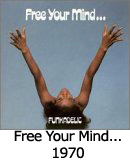 does
is link up with the audience. Now, that kind of power? I'm
not gonna fight that. I'm not gonna fight 20,000 people. I'm
gonna merge with 20,000 people. I'm gonna be a happy medium
with 20,000 people.
does
is link up with the audience. Now, that kind of power? I'm
not gonna fight that. I'm not gonna fight 20,000 people. I'm
gonna merge with 20,000 people. I'm gonna be a happy medium
with 20,000 people. 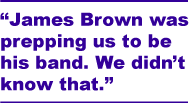 the
James Brown JBs, we played at place in Cincinnati called the
Wine Bar. In total that night, we made 15 dollars. In total.
We had a Dodge station wagon that we could put all of us in,
and all of our equipment. OK?
the
James Brown JBs, we played at place in Cincinnati called the
Wine Bar. In total that night, we made 15 dollars. In total.
We had a Dodge station wagon that we could put all of us in,
and all of our equipment. OK? 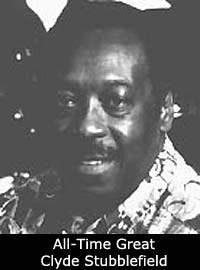 always
get an old beat up used car and we'd get a U-haul truck and
we would come back late at night most of the time with everybody
and everything, all the equipment, packed in the back of the
U-haul because we had to leave the car where it broke down
at. So these were the lean, dues-paying years,but they was
great years because we got so much out of it.
always
get an old beat up used car and we'd get a U-haul truck and
we would come back late at night most of the time with everybody
and everything, all the equipment, packed in the back of the
U-haul because we had to leave the car where it broke down
at. So these were the lean, dues-paying years,but they was
great years because we got so much out of it. 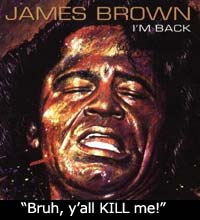 Doggett
honky tonk band, Bobby Byrd, Vicki Anderson, Marva Whitney,
Lyn Collins, Arthur Prysock, we even did stuff with Arthur
Prysock. These are people we didn't even know. We didn't even
know who these people were. Arthur Prysock was big jazz balladeer,
very famous singer. They wanted to do a soul project with
him and did a song with him called "I Wanna Go Where
The Soul Tree Grows." But like I said we didn't even
know who the guy was. It was a hell of a track, great track.
Song got a lot of attention because it was so different for
his style.
Doggett
honky tonk band, Bobby Byrd, Vicki Anderson, Marva Whitney,
Lyn Collins, Arthur Prysock, we even did stuff with Arthur
Prysock. These are people we didn't even know. We didn't even
know who these people were. Arthur Prysock was big jazz balladeer,
very famous singer. They wanted to do a soul project with
him and did a song with him called "I Wanna Go Where
The Soul Tree Grows." But like I said we didn't even
know who the guy was. It was a hell of a track, great track.
Song got a lot of attention because it was so different for
his style.  play
basketball or football, we'd go there and hang out. And record.
What James was doing, he was prepping us for if he ever needed
us. To be his band. We didn't know that. Because we were naïve.
Very young and naïve. Trippin' on the fact that, hey
man, we recording, studio, working with bla bla bla, this
is cool, you know? We had no idea that this cat was getting
us ready, just in case. So he had us standing in the wings,
right?
play
basketball or football, we'd go there and hang out. And record.
What James was doing, he was prepping us for if he ever needed
us. To be his band. We didn't know that. Because we were naïve.
Very young and naïve. Trippin' on the fact that, hey
man, we recording, studio, working with bla bla bla, this
is cool, you know? We had no idea that this cat was getting
us ready, just in case. So he had us standing in the wings,
right? 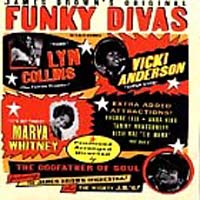 another
dressing room on the other side of the hall. They shot us
right through the middle. Straight to the stage. And these
were like cats that we idolized, like Maceo and Ritchie "Kush"
Griffith and Pee Wee Ellis and Strawberry and Melvin Parker
- these were guys we looked up to.
another
dressing room on the other side of the hall. They shot us
right through the middle. Straight to the stage. And these
were like cats that we idolized, like Maceo and Ritchie "Kush"
Griffith and Pee Wee Ellis and Strawberry and Melvin Parker
- these were guys we looked up to. 
 outta there we're making something like $450 a night apiece.
We got like three new changes of uniform with matching shoes.
We got all the equipment under the sun. We got a Golden Eagle
bus to travel on. We got an equipment truck full of equipment,
you know what I mean?
outta there we're making something like $450 a night apiece.
We got like three new changes of uniform with matching shoes.
We got all the equipment under the sun. We got a Golden Eagle
bus to travel on. We got an equipment truck full of equipment,
you know what I mean?  played
so hard and we were so strong and fired up, and we really
were always tight together, because we knew each other very
well on and off stage. And we were trying so hard. So our
whole thing was, this is James Brown. You know? You gotta
give it UP for him. You gotta be GOOD for him. I grew up,
man, listening to those drum licks, man. And Bootsy grew up
listening to the bass licks. Catfish, the guitar licks. And
we just knew - we had to dig in deep. First thing James did,
was kinda like cool us down a little. "Hey, hey, calm
down, calm down."
played
so hard and we were so strong and fired up, and we really
were always tight together, because we knew each other very
well on and off stage. And we were trying so hard. So our
whole thing was, this is James Brown. You know? You gotta
give it UP for him. You gotta be GOOD for him. I grew up,
man, listening to those drum licks, man. And Bootsy grew up
listening to the bass licks. Catfish, the guitar licks. And
we just knew - we had to dig in deep. First thing James did,
was kinda like cool us down a little. "Hey, hey, calm
down, calm down." to
that was the record didn't leave the city. A little local
thing, we didn't have any force, we didn't have any distribution.
So it didn't go nowhere or do nothing. And lo and behold,
years and years and years later, I go to Japan, and the song
is on CD. This is a little wax joint we did, you know a 45
in Cincinnati, Ohio, right? It never left the city, and never
really got ample play in the city, you know?
to
that was the record didn't leave the city. A little local
thing, we didn't have any force, we didn't have any distribution.
So it didn't go nowhere or do nothing. And lo and behold,
years and years and years later, I go to Japan, and the song
is on CD. This is a little wax joint we did, you know a 45
in Cincinnati, Ohio, right? It never left the city, and never
really got ample play in the city, you know?  black
group. After the Experience, he wanted a black group. Jimi
wanted us to quit James and he would pick us right up, and
the guys didn't feel good about that so it didn't happen.
If it had happened history might be totally different right
now, might be crazy as hell, I don't know. But we didn't do
that. But that was our cat, you know.
black
group. After the Experience, he wanted a black group. Jimi
wanted us to quit James and he would pick us right up, and
the guys didn't feel good about that so it didn't happen.
If it had happened history might be totally different right
now, might be crazy as hell, I don't know. But we didn't do
that. But that was our cat, you know. from
that point on, from that night we became Funkadelic.
from
that point on, from that night we became Funkadelic.  groove,
like Eddie Hazel, or Billy Nelson would start a groove and
one by one they would come in and just ride that groove forever.
We played arrangements. We had an arranged show. And it was
refreshing for George, you know?
groove,
like Eddie Hazel, or Billy Nelson would start a groove and
one by one they would come in and just ride that groove forever.
We played arrangements. We had an arranged show. And it was
refreshing for George, you know?  alter-ego.
Bootsy is the guy George has got in him but he just didn't
want to have to be everyday. Didn't wanna be sharp like that
and that star type thing every day. He refuted that for a
lot of years. Bootsy was right on it, right into it.
alter-ego.
Bootsy is the guy George has got in him but he just didn't
want to have to be everyday. Didn't wanna be sharp like that
and that star type thing every day. He refuted that for a
lot of years. Bootsy was right on it, right into it.  in
the industry. I remember he explained to me, remember when
he got that bad reputation for not showing up? He said what
happened was, he got so large, promoters would actually book
shows in three different places on the same night and get
the advance sales and then run. Get out of the city. And Sly
would get all the bad press.
in
the industry. I remember he explained to me, remember when
he got that bad reputation for not showing up? He said what
happened was, he got so large, promoters would actually book
shows in three different places on the same night and get
the advance sales and then run. Get out of the city. And Sly
would get all the bad press.  Greatest Funk On Earth Tour, that's with P-Funk, Rubber Band,
Roger Troutman & Zapp, the whole P-Funk mob was there,
Sly Stone included. He and George did a lot of studio stuff.
It was a good thing, you know, it really got him back into
at least music, because he's one of the most prolific writers
to this day. What happened from that was that he and Jesse
Johnson from the group The Time, they went into the studio
after that little run, they came up with a #1 hit, "Crazay."
Greatest Funk On Earth Tour, that's with P-Funk, Rubber Band,
Roger Troutman & Zapp, the whole P-Funk mob was there,
Sly Stone included. He and George did a lot of studio stuff.
It was a good thing, you know, it really got him back into
at least music, because he's one of the most prolific writers
to this day. What happened from that was that he and Jesse
Johnson from the group The Time, they went into the studio
after that little run, they came up with a #1 hit, "Crazay." keep
with it and experience new and different things - my real
draw card is, as long as I know these different cities want
us to come and perform and entertain, they know it's going
to be a good time; they know we gonna bring George and it's
gonna be a positive experience. As long as we got that going
on? Hey man, I'm there. I am there.
keep
with it and experience new and different things - my real
draw card is, as long as I know these different cities want
us to come and perform and entertain, they know it's going
to be a good time; they know we gonna bring George and it's
gonna be a positive experience. As long as we got that going
on? Hey man, I'm there. I am there. to
be a time where the after-party was a big deal. After a while,
people realize this is the show and the after-party all in
one. Ain't nobody else doing four hours but us, no way. To
this day. They think we're crazy, our buddies and cohorts,
artists and entertainers, they think we're out of our mind.
You got to rest for that, eat right for it. You gotta be smart
and take good care of yourself.
to
be a time where the after-party was a big deal. After a while,
people realize this is the show and the after-party all in
one. Ain't nobody else doing four hours but us, no way. To
this day. They think we're crazy, our buddies and cohorts,
artists and entertainers, they think we're out of our mind.
You got to rest for that, eat right for it. You gotta be smart
and take good care of yourself. of
a show. Now before and after that show, you're holding yourself
up. But during that show it's funny how that motivation is
there like that. Cuts through everything. Incredible, man.
It's something I don't question and I don't try to figure
out. I leave that alone because that works. That works on
its own.
of
a show. Now before and after that show, you're holding yourself
up. But during that show it's funny how that motivation is
there like that. Cuts through everything. Incredible, man.
It's something I don't question and I don't try to figure
out. I leave that alone because that works. That works on
its own. onstage
and they saw we were locked in. And that's one of those times
early on that showed me the power that I had. About being
a responsible drummer in a big group like that.
onstage
and they saw we were locked in. And that's one of those times
early on that showed me the power that I had. About being
a responsible drummer in a big group like that.  rather
than being in people's faces all they time - "Hey, man!
I got this! I got that! Bla bla bla!" - I'm not that
guy. I don't knock it but I'm not that guy. So when I did
start letting people hear my stuff, I'd always hear the same
thing.
rather
than being in people's faces all they time - "Hey, man!
I got this! I got that! Bla bla bla!" - I'm not that
guy. I don't knock it but I'm not that guy. So when I did
start letting people hear my stuff, I'd always hear the same
thing. community.
I did that on purpose because I went for a long time fighting
the sequencers, the MPCs and all that stuff. I turned on
the radio one day and everything I heard on the Top Ten was
done by MPC sequencers. I said, you know what? I can't be
corny. Because we got rejected when we first came in the game.
I said, now I'm not going to turn into that. So I buckled
down, I read and started learning.
community.
I did that on purpose because I went for a long time fighting
the sequencers, the MPCs and all that stuff. I turned on
the radio one day and everything I heard on the Top Ten was
done by MPC sequencers. I said, you know what? I can't be
corny. Because we got rejected when we first came in the game.
I said, now I'm not going to turn into that. So I buckled
down, I read and started learning.  Nation.
Everybody loved it - it worked. Our first gig was at the 1650
Schrader club in Hollywood. It was a bang-up night. We headlined,
we did very well, had a great reception, we had industry people
there, we had fans there, we had great loyal support, everybody
was glad we were doing it - it was perfect. I'm looking for
big things out of that.
Nation.
Everybody loved it - it worked. Our first gig was at the 1650
Schrader club in Hollywood. It was a bang-up night. We headlined,
we did very well, had a great reception, we had industry people
there, we had fans there, we had great loyal support, everybody
was glad we were doing it - it was perfect. I'm looking for
big things out of that. 
